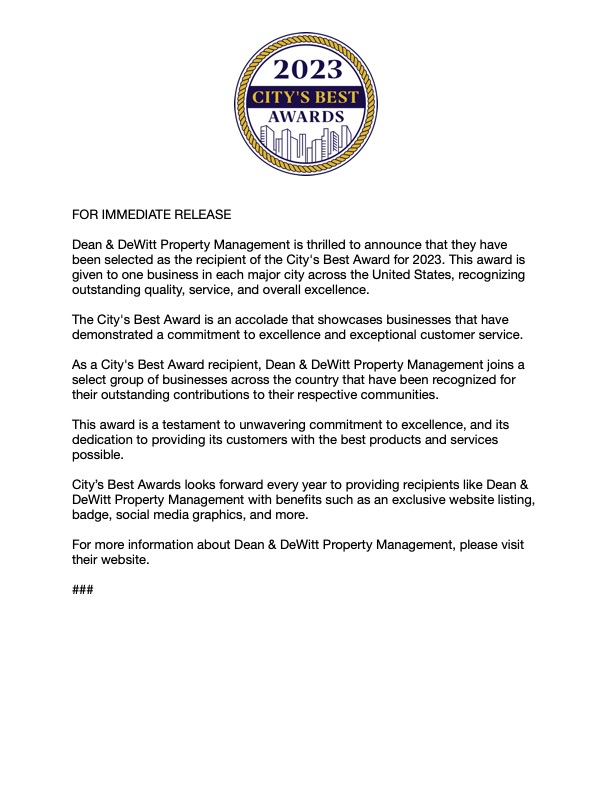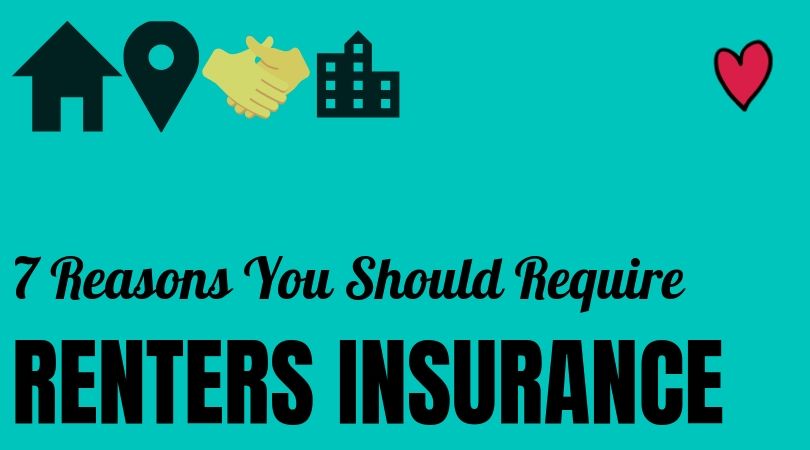City's Best!

Dean & DeWitt Property Management
Call: (727) 820-0352
Landlord and tenant relationships aren’t always the easiest to navigate, but they don’t have to be stressful. If you’re thinking of relocating to a new property but aren’t sure what to expect, or you’re renting for the first time – you may have some questions.
Knowing what a property manager is looking for from you can help to avoid any nasty situations and keep you on top of your game and save you both a lot of hassle. If you want to know everything you need to know before moving into the rental of your dreams in St Petersburg (be sure to check out the Dalí Museum if you do decide to move here - it’s a must see for culture lovers) or anywhere else for that matter, keep reading for our top five tips.
While it might seem like the most obvious piece of advice, timing is key to maintaining a good relationship with your property manager.
Things like making sure your rent is always paid on time and properties are cleared out on the exact date you’re moving to a new property; make a huge difference and they don’t go unnoticed. If you had a broken pipe, you would expect a timely response, so it’s only fair to offer the same in return.
It’s not always easy to keep your cool in stressful situations. If something breaks it’s easy to jump the gun and go for an aggressive approach, but your property manager will be far more receptive if you calmly explain the situation.
Especially when it comes to making a long distance move to a new city, it can be hard not to get overwhelmed. However, the good news is, St Petersburg is among the top cities to live in, especially if you’re thinking of retiring. Long distance moving companies like Bellhops can also help alleviate some of the stress of making a big move. But try to keep a clear head and give your property manager sufficient time to fix any problems if you can, you’ll find that the same kindness will be returned.
As annoying as some rules may seem, usually they are not the fault of your property manager – and it’s important to remember that you agreed to them before signing your lease.
While you may really want a puppy or to redecorate a room, just make sure you’re allowed to do so ahead of time. And if you’re not sure, it never hurts to ask!
Contrary to popular belief, your property manager is not out to get you. We want the best possible outcome for all parties, if you’re not satisfied just let us know and as long as the request is reasonable and asked politely – we’re always going to try our best to make sure both the tenant and property owner are content!
Once you have moved into your new rental, just make sure to refer to these tips whenever you’re unsure about how to handle a situation. And don’t be afraid to ask your property manager questions before or during the process.
Pinellas County granted $21.4 million for rental assistance program
Are you behind on rent due to the COVID-19 pandemic?
Financial help is now available through Pinellas County’s new Emergency Rental Assistance Program.
You may qualify if:
You’ve lost your job or significant income due to the COVID-19 pandemic,
You’re behind on rent payments or at risk of missing a rent payment, and
You have a household income at or below 80% of the area median income (AMI). To check your household’s AMI eligibility, visit: www.bit.ly/rental-ami
The insurance market is saturated with dozens upon dozens of insurance companies, carriers, agents, brokers, marketplaces, and aggregators all offering “the best” renters insurance policies, coverage, and discounts. In an ideal world, that would mean companies are competing for their customers’ business by offering genuinely great deals. We don’t live in an ideal world, however, and not all insurance policies are created equal.
Luckily, not all renters’ situations are created equal either. The best policy and policy provider for Tom isn't necessarily the most appropriate for Harry. The downside of this, of course, is that navigating the industry can be extremely frustrating, especially if you also have a job, family, and personal issues to manage.
In order to make the decision on whether to get a renters insurance policy, it is important to know what’s covered, the three types of coverages typically available, and what to watch out for when purchasing your own policy. The editorial team at Money studied the market and this is some of the information they gathered.
Please note that each insurance company has different exclusions and coverage limits. Not fully understanding what's included and excluded could lead to problems and frustrations down the road when you have to file a claim.
There are three essential types of coverage:
They may even cover the cost of boarding a pet, storing property, or transportation costs to and from work at your temporary accommodation.
Once you’ve determined the best type of coverage that fits your lifestyle, take a detailed look at determining your coverage limit. It varies depending on the type of coverage chosen!
Note that there are some typical exclusions for coverage. These include animals, your roommates and their belongings, and even flooding or earthquakes. It’s always important to ask your provider what these include.
Insurance is all about risk management. If an insurance carrier considers you to be negligent, to have a questionable credit history, or to lack enough security measures in place, or if you have frequently missed payments or have a criminal record that deems you a “moral risk”, your carrier might cancel your policy or outright refuse to insure you.
One way to minimize the risk of your policy being canceled is to demonstrate consistent responsibility: keeping receipts (especially of your most valuable belongings), maintaining your property (general upkeep), taking safety measures (having alarms, deadbolts, and smoke detectors), and most importantly, updating your insurer of any events and changes to your property or situation. Although this constant accountability might seem like a lot of work, it can save you time and money at the moment of filing claims and prevent an insurer from cancelling your policy. Again, it comes down to how you are minimizing risks.
If you’re not a homeowner, for which you would need homeowners insurance, or a college student living on-campus, covered by your parents’ or the university’s insurance, you definitely need renters insurance. Many people think that they don’t need renters insurance because they do not own many things of value. However, the lowest insurance deductible tends to be $500. Unless you own less than that in valuables, not having insurance is increasingly risky.
An affordable laptop costs around $150. Low priced television screens go for around $100, and generic smartphones can be as low as $55. Together, that’s already $300. Add in a couple of books, a video game console, and a handful of gadgets, and you’ve got at least $500 worth of property.
Many renters average $25,000-$30,000 in property value. An average of $16 a month is definitely worth the peace of mind of knowing you will be covered if disaster strikes and that’s not even considering loss of use and personal liability if someone has an accident while at your place. Families and customers with higher coverage needs (over $50,000 in personal property) would likely pay more than $30 a month, though this is still a small amount in comparison to the value covered.
Insurance is all about risk management. If an insurance carrier considers you to be negligent, to have a questionable credit history, or to lack enough security measures in place, or if you have frequently missed payments or have a criminal record that deems you a “moral risk”, your carrier might cancel your policy or outright refuse to insure you.
One way to minimize the risk of your policy being canceled is to demonstrate consistent responsibility: keeping receipts (especially of your most valuable belongings), maintaining your property (general upkeep), taking safety measures (having alarms, deadbolts, and smoke detectors), and most importantly, updating your insurer of any events and changes to your property or situation. Although this constant accountability might seem like a lot of work, it can save you time and money at the moment of filing claims and prevent an insurer from cancelling your policy. Again, it comes down to how you are minimizing risks.
Lastly, there are ways to save. Some insurances will give ‘bundle discounts’ if you have other insurance or services with them. Other saving methods involve having safety devices installed in your home such as smoke detectors, security cameras, alarms, deadbolts, and more. There’s never harm in comparing quotes, doing some research about coverage before making your choice and asking your providers what type of discounts they might offer. Visit Money.com to read more about their findings on renter’s insurance and more.
Owning a rental property can be an exciting and lucrative venture. People are always looking for great places to live in St. Petersburg, so if you have a property in a great location that you know how to maintain and care for, you're sure to attract plenty of tenants. However, having a home available for rent and managing the people who want to rent from you are two very different things.
Most rental property owners find that their lives get a lot easier when they start working with the right people and partners. For instance, knowing the right St. Petersburg moversto help your new residents to move into their new place can be an excellent way to speed things along when you want to avoid vacancies in your rental schedule. Having the number of a handyman to help you fix problems around the property, or a decorator to keep the style of your home up-to-date always comes in handy. However, the most valuable professional any rental apartment owner can work with has to be a property manager.
When you buy a rental property, you want to focus on getting a return on your investment, with plenty of happy and consistent tenants. However, there's a lot more work involved than many people realise. For instance, before tenants move into your new home, you'll need to screen them to make sure that you're handing the keys over to someone that you can trust. Unfortunately, it's difficult to know what questions to ask during a screening interview when you're a beginner.
Property managers can handle the screening process, ensuring that you only get the highest quality of tenants in your home. This reduces the risk that you'll have to deal with dangerous tenants who could harm your investment. At the same time, property managers can help you to avoid further legal issues with tenants in the future by making sure that every document is completed correctly. Not knowing the laws around rentals inside and out can often make you vulnerable to problems, but a Property Manager will ensure you're thoroughly protected with:
Property managers ensure that you don't have to spend all of your time worrying about how you're going to look after the rental homethat you've bought. After all, it's all too easy to forget about little home maintenance details when you're not living in the property in question. When you're working with a property manager, you can:
At the same time, with a property manager, you can rest assured that you won't be left to make all the hard decisions about dealing with tenants on your own. It won't be up to you to determine whether you should accept late rent without a fee or evict tenants who aren't living up to their end of the rental agreement. Your property manager takes that stress off your shoulders, so you can enjoy all the benefits of owning a rental property, without any of the headaches.

Many renters still think that a renters insurance is unnecessary, according to an article by Forbes. Two reasons could explain this.
One, is that tenants might have the impression that it’s the landlord who’s responsible for their possessions. Unfortunately, landlords insurance doesn’t cover tenant property losses. And two, tenants might underestimate the value of their belongings.
Requiring your St. Petersburg tenant to have renters insurance can be worthwhile. It can help protect them against any property damage resulting from a covered peril.
Are you on the fence regarding requiring your tenant to have renters insurance?
If you are, then this article is meant for you. You’ll learn some of the benefits it can provide you and your tenants.
Yes, you can!
As a landlord, you can make it a requirement in the leasing process. However, before including it on your lease, it’s recommended that you check first with your local and state laws.

Just like homeowners insurance, renters insurance may be able to cover the cost of replacing personal possessions in the event that they are stolen or damaged. Good examples of such possessions include a bicycle, furniture, a television set, or a computer.
However, homeowners insurance won’t cover the damage caused to buildings or structures. In such a case, you would need a landlords insurance policy.
So, what exactly does renters insurance cover?
According to Nolo, here is what a typical renters insurance will cover:
Did you know that up to 68% of U.S. households own a pet? That is at least according to the American Pet Products Association (APPA).
Essentially, this means that landlords who allow pets have a wider pool of tenants to choose from.

That said, allowing pets into a property has its risks. There is the potential risk of property damage and dog-bite liability. Thankfully, renters insurance can help mitigate against such risks.
Coverage may be dependent upon several things. It can depend on the state, animal type, and the insurance company.
If you are requiring tenants to have renters insurance solely for allowing pets, then it may be worthwhile to check whether your tenants policy covers liability from pets.
Suppose your tenant causes damage to your St. Petersburgh property. While your insurance policy may cover the repair costs, you may still be stuck covering the deductible.
The deductible can be a huge sum of money.
Supposing your tenant is insured means that you’ll be off the hook when it comes to paying your deductible. This is because renters insurance usually covers this in the policy.
If a potential tenant says they can’t afford renters insurance, it may be best to just walk away. If a tenant can’t afford the monthly rate for renters insurance, just how close to the edge is he or she living?
What are the chances that he will not be able to pay rent at some point during his or her tenancy?
Living paycheck to paycheck is totally fine. However, such people tend to usually be the hardest tenants to deal with.
Requiring your tenants to have renters insurance shows that you are concerned about their wellbeing. It ensures that in case of theft, or fire and water damage, that they will have their losses covered.

Renters insurance coverage also ensures that they have alternative housing as they wait for their property to be repaired.
You’ll be able to stop any disputes over stolen or damaged property when your renters are adequately covered. Conversely, without being covered, you may expose yourself to liability should something happen.
As a landlord, you may find yourself facing unnecessary court battles, as they may try to shift the blame over to you.
Requiring your renters to obtain a renters insurance is a simple and affordable way to prevent avoidable conflicts.
Content of suites aren’t covered under a landlords building insurance. Contents can only be covered if a tenant has renters insurance coverage.
With renters insurance, your tenants can have a peace of mind knowing that their belongings are covered regardless of where they are.
But without coverage – who do you think they will claim is responsible?
If there are too many claims, your premiums can increase. In some cases, your insurance company can even cancel it instead of renewing it.
But when a tenant is insured, their policy may cover all or a portion of the loss.

Consequently, this could potentially lower the chance of your own premiums increasing.
In a way, renters insurance also benefits landlords.
If a tenant isn’t covered and huge losses ensue, they may as well pack up and leave than deal with the costly aftermath. With coverage, however, they can rest-assured knowing that their losses will be taken care of.
That’s another way of looking out for your tenants and your investment property.
